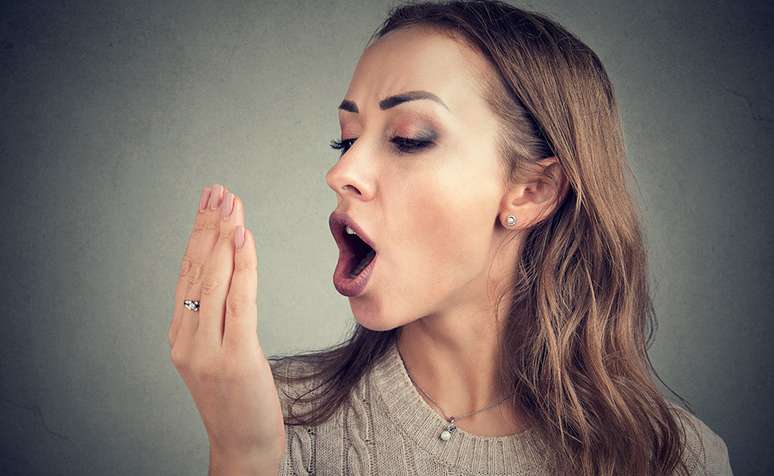Bad breath or bad habit? If you have these 8 habits, you probably have bad breath
Bad breath is a problem that affects a large part of the world’s population and can be very embarrassing in various social situations. However, many people are unaware that this problem can be caused by daily habits that damage oral health. The good news is that it can be prevented with some simple habit changes.
According to the Brazilian Bad Breath Association (ABHA), approximately 30% of the Brazilian population suffers from bad breath. It is a problem that can affect people’s self-esteem and quality of life, as well as damage social and professional relationships.
Dental surgeon, oral health and bad breath specialist, Bruna Conde, has bad habits that can cause bad breath. Follow below.
1. Don’t floss your teeth
Many people neglect flossing in their oral care routine, which is a huge mistake. Flossing is responsible for removing food debris and bacterial plaque that build up between your teeth and that brushing can’t reach.
“Lack of floss can lead to the buildup of bacteria that produce bad breath. Therefore, it’s important to include flossing in your daily oral care routine,” says the dentist.
2. Don’t brush your teeth before going to bed
During the day, the mouth accumulates food waste and bacteria. If these residues and bacteria are not removed properly, they can build up during the night, resulting in an unpleasant mouth odor in the morning.
“During sleep, saliva production decreases, which can promote the growth of bacteria in the mouth and contribute to bad breath. If teeth are not brushed before bed, food particles and bacteria present in the mouth can accumulate in the teeth and gums, causing tooth decay, periodontal disease, and other oral health issues that contribute to bad breath,” she says.
3. Smoking
Smoking is a major cause of bad breath. Tobacco contains many chemicals that can affect oral health, including producing bad breath. When we smoke, the smell of tobacco is impregnated in the mouth and lungs and can remain for a long time.
“Tobacco can reduce the production of saliva, which can promote the growth of bacteria in the mouth and contribute to bad breath. Saliva plays an important role in the prevention of bad breath, as it helps neutralize the acids produced by the bacteria in the mouth” .
4. Excess alcoholic beverage
“Excessive alcohol consumption can cause dehydration and dry mouth, which increases the risk of bad breath. In addition, alcohol is metabolized by the liver and exhaled by the lungs, which can leave an unpleasant odor in the mouth. Therefore, it is It’s important to avoid excessive consumption of alcoholic beverages and always stay hydrated,” says Bruna.
5. Inadequate food
A diet high in processed sugars can promote the growth of bacteria that produce bad breath. Some foods can be difficult to digest and can stay in the mouth for a long time.
“When food debris gets trapped in the mouth, bacteria in saliva begin to break it down, producing volatile sulfur compounds that can cause bad breath. To prevent bad breath caused by poor nutrition, it is important to maintain a balanced diet and varied, with an adequate intake of carbohydrates, proteins, fats and vitamins, and it is also important to always clean your mouth after meals,” he adds.
6. Going too long without eating
Going too long without eating can contribute to bad breath in several ways. When we don’t eat for long periods, the body starts breaking down fat stores for energy. During this process, ketones are produced, which can be eliminated by breathing, causing an unpleasant odor in the mouth.
“To prevent bad breath caused by lack of food, it’s important to maintain a balanced diet and eat regular meals throughout the day. It’s also important to stay hydrated, by drinking water regularly to avoid dehydration and reduced saliva production.”
7. Don’t brush your tongue
Tongue cleaning is an important habit in the oral hygiene routine that many people neglect. Lingual saburra is a whitish layer that forms on the surface of the tongue due to the accumulation of food remains, dead cells and bacteria. This layer can be the cause of bad breath in many cases.
“The tongue is a conducive place for the bacteria that cause bad breath to accumulate, so proper cleaning of the tongue is essential to keep breath fresh. In addition, cleaning the tongue can help prevent oral health problems such as tooth decay and periodontal disease,” Bruna points out.
The tongue cleaner is a specific tool for this purpose. It is a tool that is found in pharmacies and dental product stores and is used to remove the lingual coating from the surface of the tongue. It is important to choose a tongue cleaner that is comfortable and easy to use.
8. Drink little water (keep your mouth dry)
Lack of water is one of the major contributing factors to dry mouth. When we don’t drink enough water, the body can become dehydrated and saliva production can be affected. Additionally, excessive alcohol and caffeine consumption can contribute to dehydration and dry mouth.
Dry mouth, or xerostomia, is a problem that occurs when saliva production is reduced or stopped. Saliva is important for keeping the mouth hydrated and lubricated, as well as aiding in the digestion of food and preventing tooth decay and periodontal disease. When your mouth becomes dry, saliva production is reduced which can lead to an increase in bad breath.
Lack of salivation can leave your mouth dry and promote the growth of bacteria that produce bad breath. Saliva plays an important role in neutralizing the acids produced by bacteria in the mouth, helping to prevent bad breath. Additionally, saliva contains enzymes that help break down food and prevent plaque from building up on your teeth.
To prevent dry mouth and bad breath, it is important to stay hydrated by drinking water regularly and avoiding excessive alcohol and caffeine consumption. It’s also important to brush your teeth regularly, floss your teeth, and clean your tongue to prevent bacteria from building up in your mouth.
Additionally, it’s important to see a dentist regularly to evaluate your oral health and prevent problems like tooth decay and periodontal disease, which can also contribute to bad breath.
“Therefore, it is essential to raise awareness of the importance of healthy oral hygiene and eating habits to prevent bad breath. As an oral health and bad breath expert, I recommend everyone to adopt these simple habit changes to maintain a healthy mouth and a fresh breath “Remember: prevention is always the best option to avoid oral health problems and maintain the quality of your life. Take care of your oral health and have fresh and pleasant breath!” concludes Bruna Conde.
HOMEWORK inspires transformation in the world of work, in business, in society. Created by Compasso, a content and connection agency.
Source: Terra
Rose James is a Gossipify movie and series reviewer known for her in-depth analysis and unique perspective on the latest releases. With a background in film studies, she provides engaging and informative reviews, and keeps readers up to date with industry trends and emerging talents.


![Un Si Grand Soleil Preview: Episode Summary for Tuesday, October 21, 2025 [SPOILERS] Un Si Grand Soleil Preview: Episode Summary for Tuesday, October 21, 2025 [SPOILERS]](https://fr.web.img4.acsta.net/img/c7/7f/c77f5c02e3632e8e611d5041c2b9f36e.jpg)



